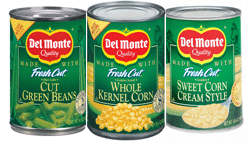If you read articles or blogs about healthy eating, eventually, you will read that you should be eating more fresh fruits and vegetables. But the reality is that fresh fruits and vegetables aren’t always available. These days, canned or frozen fruits and veggies are fairly cheap, convenient ways to get your greens.
But are canned and frozen vegetables just as good as fresh ones? Maybe.
The biggest factor in the amount of nutrients found in canned or frozen foods versus fresh foods is the amount of time that passed between harvesting and processing. The longer food sits around waiting to be canned or frozen, the more the “good stuff” inside- the vitamins, minerals, and fiber-will disappear. However, this is not a large concern for today’s consumer as most companies today have very short waiting periods before food is processed- potentially shorter than the time it takes your fresh fruit to get from the farm to the store. So if the nutrients aren’t considerably different because of processing or travel time, what is different?
The nutritional value of canned and frozen produce also depends on how it’s packaged and prepared. For example, canned foods with a lot of added sodium, or salt, are much less nutritious than their fresh or frozen counterparts. Food scientists at the University of Tennessee found that you can easily reduce up to 40% of the extra sodium in canned beans simply by draining and rinsing them before adding them to your recipe! Similarly, canned fruit packed in heavy syrup has much more sugar than fresh or frozen fruit. However, canned fruit packed in its own juice generally has much less added sugar and is nutritionally comparable to fresh fruit.
In regard to other proccesses/preparation, one thing to remember about any type of fruit or vegetable is that cooking can also affect nutrient content. To make sure you get the most nutrients out of your fruits and veggies, try lightly steaming them (either on the stove or in the microwave, see instructions here) instead of boiling them in water for long periods of time. Also, to make sure your frozen foods are tasting their best, buy packages that are frozen solid and don’t have ice on the outside of the bag. This can be a sign that the bag has thawed and refrozen. While thawing and refreezing doesn’t affect the nutritional quality of the food, too much refreezing can affect the food’s texture. Canned goods should also be used before their expiration date for best flavor.
In the end, as long as you make some effort to avoid canned or frozen items with lots of added salt and sugar, it doesn’t really matter where you get your fruits and vegetables. What's most important is that you’re actually eating them!
References:
http://healthlibrary.epnet.com/GetContent.aspx?token=a4c1f00b-d245-44f2-a90e-20b047f84a6a&chunkiid=160561
Healthy Eatings!
-Anth249 H
Healthy Eatings!
-Anth249 H

No comments:
Post a Comment